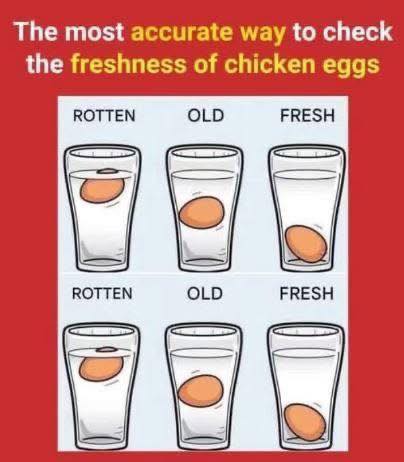
The Ultimate Trick to Tell If an Egg Is Fresh – And Yes, It Really Works!
Eggs are a staple in nearly every kitchen. Whether you’re frying them up for breakfast, baking a decadent cake, or adding richness to a savory dinner, eggs are often the unsung heroes of our favorite dishes. But here’s the thing: the freshness of your eggs matters—a lot. It affects not only the taste and texture but also how well they cook and, most importantly, your safety.
So, how can you tell if those eggs in your fridge are still good? Don’t worry—there are a few tried-and-true methods you can use right at home to check egg freshness, and they’re surprisingly simple.
Why Fresh Eggs Matter
Before diving into the tests, let’s take a quick look at why egg freshness is more than just a preference:
- Taste & Texture: Fresh eggs taste better and have a firmer, more appealing texture—especially in dishes where the egg is the star, like poached eggs or omelets.
- Baking & Cooking Performance: In baking, fresh eggs provide better volume and structure. Older eggs can lead to flatter cakes and less lift in meringues.
- Food Safety: While properly stored eggs often last beyond their sell-by date, spoiled eggs can cause foodborne illness. Knowing how to spot them is crucial.
5 Easy Ways to Check Egg Freshness
You don’t need any fancy tools—just a few quick tests to find out if your eggs are still good:
1. Check the Date
Start by looking at the sell-by or expiration date on the carton. Keep in mind: eggs can often stay fresh for weeks beyond that if refrigerated properly. Use the date as a general guide, not an absolute rule.
2. The Float Test (Most Reliable!)
Fill a bowl with cold water and gently place your egg in it:
- Sinks and lays flat? Super fresh.
- Stands upright or tilts? Still usable, but not at peak freshness.
- Floats to the top? Bad egg—toss it immediately.
3. The Shake Test
Hold the egg up to your ear and shake it gently. Hear a sloshing sound? That’s a sign the egg is old. A fresh egg should sound solid and quiet.
4. Crack and Inspect
Crack the egg onto a clean plate or bowl:
- Fresh eggs will have a firm yolk that stands tall, surrounded by a thick, gel-like white.
- Older eggs tend to have flatter yolks and watery, runny whites.
5. The Sniff Test
When in doubt, smell it. A spoiled egg has a strong, sulfur-like odor that’s impossible to miss. If it smells even slightly off—don’t risk it.
Final Tip: Keep your eggs stored in their original carton in the coldest part of your fridge—not in the door. This helps them stay fresh longer!
Now that you know how to tell if an egg is fresh, you can crack with confidence—whether you’re baking, frying, or scrambling.